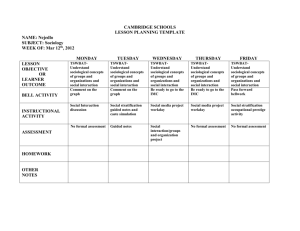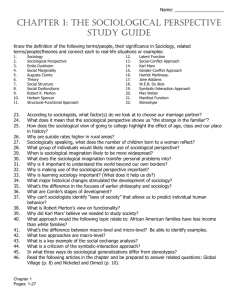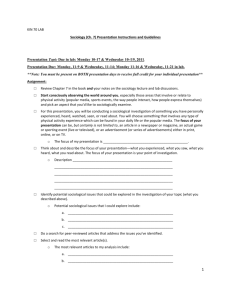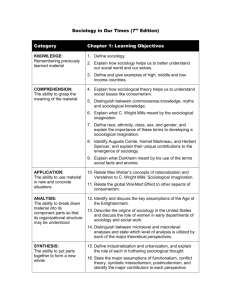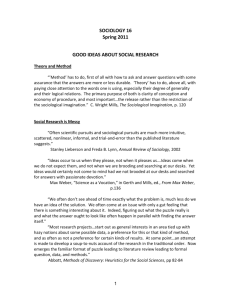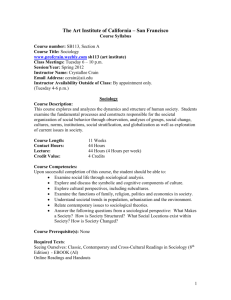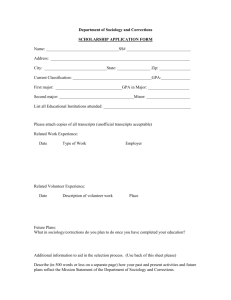Sociology 3411 WA Sociological Theory 1920s and Beyond
advertisement
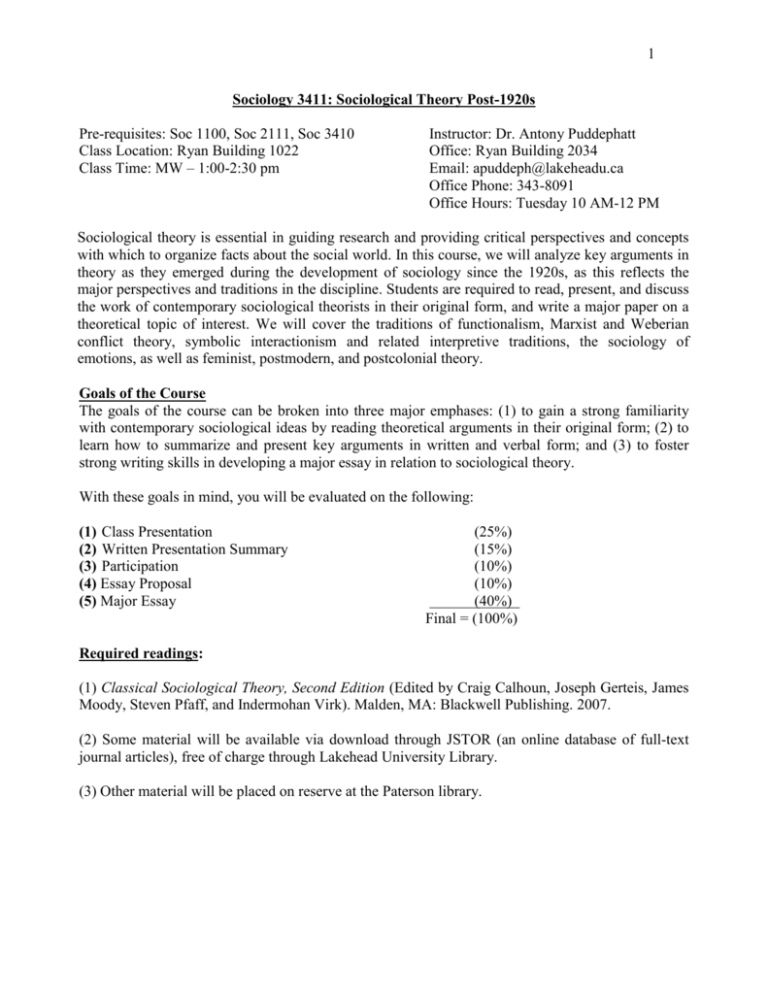
1 Sociology 3411: Sociological Theory Post-1920s Pre-requisites: Soc 1100, Soc 2111, Soc 3410 Class Location: Ryan Building 1022 Class Time: MW – 1:00-2:30 pm Instructor: Dr. Antony Puddephatt Office: Ryan Building 2034 Email: apuddeph@lakeheadu.ca Office Phone: 343-8091 Office Hours: Tuesday 10 AM-12 PM Sociological theory is essential in guiding research and providing critical perspectives and concepts with which to organize facts about the social world. In this course, we will analyze key arguments in theory as they emerged during the development of sociology since the 1920s, as this reflects the major perspectives and traditions in the discipline. Students are required to read, present, and discuss the work of contemporary sociological theorists in their original form, and write a major paper on a theoretical topic of interest. We will cover the traditions of functionalism, Marxist and Weberian conflict theory, symbolic interactionism and related interpretive traditions, the sociology of emotions, as well as feminist, postmodern, and postcolonial theory. Goals of the Course The goals of the course can be broken into three major emphases: (1) to gain a strong familiarity with contemporary sociological ideas by reading theoretical arguments in their original form; (2) to learn how to summarize and present key arguments in written and verbal form; and (3) to foster strong writing skills in developing a major essay in relation to sociological theory. With these goals in mind, you will be evaluated on the following: (1) Class Presentation (2) Written Presentation Summary (3) Participation (4) Essay Proposal (5) Major Essay (25%) (15%) (10%) (10%) (40%) Final = (100%) Required readings: (1) Classical Sociological Theory, Second Edition (Edited by Craig Calhoun, Joseph Gerteis, James Moody, Steven Pfaff, and Indermohan Virk). Malden, MA: Blackwell Publishing. 2007. (2) Some material will be available via download through JSTOR (an online database of full-text journal articles), free of charge through Lakehead University Library. (3) Other material will be placed on reserve at the Paterson library. 2 EXPLANATION OF ASSIGNMENTS: 1. Class Presentation You are responsible for presenting the content of the readings to the class for one day. Due to the class size, specific presentation dates will be assigned on the first day. On your chosen presentation date, you will provide a summary sheet to hand out to the class, which will serve as a guide to the key points of the argument from the reading(s). The presentation itself should also involve the class in some way by opening up discussion and asking the class questions as appropriate. You are expected to prepare seriously for this, since it is worth 25% of your grade, and the rest of the class is depending on you. You should aim to present for 45-60 minutes, leaving some time for discussion after you have finished. 2. Written Presentation Summary On the day you present, you are required to hand in a 4 page (double spaced, 12 pt times new roman) written summary and critical discussion of the reading for that day. This should be concise, to the point, yet should cover all the main points of the argument as well as your own critical opinion along the way. This is worth 15% of your grade, and should be well written and well organized. 3. Participation Since the presentations hinge to some extent on the degree of participation, the class is expected to help the presenter by participating, asking questions, and attempting answers where appropriate. This is important both in the spirit of goodwill to your fellow presenters and since 10% of your grade depends on this (active participation over and above attendance). 4. Essay Proposal You will be required to write a major essay on a theoretical topic of your choice. Since this is somewhat open-ended, it will be helpful for you to clear the topic with me before you start. As such, a 4 page (double spaced, 12 pt. times new roman) proposal will be due January 30 so that I can provide you with feedback, and hopefully, head off any potential problems early on. 5. Major Essay The major requirement for evaluation will be a major essay that is 10 pages long (times new roman, double spaced), which explores a theoretical topic of your choice. This topic is your own to choose, but you should clear this topic with me before you get started to insure that you are on the right track. The following are general ideas for possible essays: Assess the contributions of a particular sociological theorist Compare and Contrast two or more theorists’ approaches to a particular issue Assess the contributions of a particular school of thought to some topic Examine a debate that exists between particular theorists or schools of thought Apply a particular theoretical perspective to better understand a current social issue in the media Review different theoretical approaches to some area of thought 3 SCHEDULE OF READINGS INTRODUCTION January 9 Welcome to the class Assignment of Class Presentations STRUCTURAL FUNCTIONALIST THEORY January 14 Talcott Parsons “The Position of Sociological Theory,” and “Structural Components of the Social System,” in Classical Sociological Theory (Calhoun et al. text) January 16 Talcott Parsons “An Outline of the Social System,” in Classical Sociological Theory (Calhoun et al. text) January 18 Robert Merton “Manifest and Latent Functions,” and “On Sociological Theories of the Middle Range,” in Classical Sociological Theory (Calhoun et al. text) January 23 Robert Merton “Social Structure and Anomie,” in Classical Sociological Theory (Calhoun et al. text) January 28 Jeffrey Alexander “After Neo-functionalism,” and Lewis Coser “The Functions of Social Conflict” both in Peter Kivisto (ed.) Social Theory: Roots and Branches (Book is available on reserve at Paterson Library). NEO-MARXISM AND CRITICAL THEORY January 30 Karl Mannheim, “Ideology and Utopia,” in Classical Sociological Theory (Calhoun et al. text) February 4 Max Horkheimer, “Traditional and Critical Theory,” in Classical Sociological Theory (Calhoun et al. text) ********* ESSAY PROPOSAL DUE *********** February 6 Walter Benjamin: “The Work of Art in Age of Mechanical Reproduction,” in Classical Sociological Theory (Calhoun et al. text) 4 February 11 Max Horkheimer and Theodor Adorno: “The Culture Industry: Enlightenment as Mass Deception,” and Herbert Marcuse “One-Dimensional Man,” in Classical Sociological Theory (Calhoun et al. text) WEBERIAN CONFLICT THEORY February 13 C. Wright Mills – “The Structure of Power in American Society,” British Journal of Sociology, 9(1). Avaliable through JSTOR. February 18 -- February 22 Reading Week! February 25 Randall Collins – “A Micro-Macro Theory of Social Inequality” Sociological Theory, 18(1) Available through JSTOR. *** cannot choose this for presentation*** SYMBOLIC INTERACTION AND INTERPRETIVE THEORY February 27 George Herbert Mead, “The Self,” in Classical Sociological Theory (Calhoun et al. text) March 3 Herbert Blumer, “What is Wrong with Social Theory?” American Sociological Review, 19(1); and Herbert Blumer “Sociological Implications of the Thought of George Herbert Mead,” American Journal of Sociology, 71(5). Both available through JSTOR. March 5 Erving Goffman, “The Presentation of Self” in Bailey and Gayle (eds.) Social Theory: Essential Readings, 2nd Edition. (Book on reserve at Paterson Library). March 10 Harold Garfinkel “Studies of the Routine Grounds of Everyday Activities,” Social Problems, 11(3). Available through JSTOR. SOCIOLOGICAL THEORIES OF EMOTION March 12 Sigmund Freud “Civilization and its Discontents,” in Classical Sociological Theory (Calhoun et al. text), and Nobert Elias “Shame and Repugnance,” in Peter Kivisto (ed.) Social Theory: Roots and Branches (Book available on reserve at Paterson Library). March 17 Jonathan H. Turner “The Emotional Repertoire of Humans,” in Jonathan H. Turner’s On the Origins of Human Emotions: A Sociological Inquiry into the Evolution of Human Affect. Book available on Reserve at the Paterson Library. 5 March 19 Arlie Hochschild “Emotion Work, Feeling Rules, and Social Structure,” American Journal of Sociology, 85(3). Available through JSTOR. March 24 (holiday!!) FEMINIST THEORY March 26 Dorothy Smith “A Peculiar Eclipsing: Women’s Exclusion from Man’s Culture,” in Social Theory: Essential Readings, 2nd Edition (Book on reserve at Paterson Library). March 31 Bell Hooks “Feminism: A Movement to End Sexist Oppression,” in Gordon Bailey and Noga Gayle (eds.) Social Theory: Essential Readings, 2nd Edition (Book on reserve at Paterson Library). POSTMODERN AND POSTCOLONIAL THEORY April 2 Mike Featherstone “Modern and Postmodern,” and Jean Baudrillard “Advertising,” in Peter Kivisto (ed.) Social Theory: Roots and Branches (Book available on reserve at Paterson Library). April 7 Edward Said “Orientalism Now,” in Gordon Bailey and Noga Gayle (eds.) Social Theory: Essential Readings, 2nd Edition (Book on reserve at Paterson Library). 6 POLICY ON LATE ASSIGNMENTS: All work handed in past the deadlines shown will be deducted 5% per day for that particular requirement, not including weekends. Please hand in your work on time! As a general rule, spending more time on things usually does not improve the work enough to justify the late penalties. Also note that this does not apply for the daily summaries, only the larger writing assignments. POLICY ON ACADEMIC DISHONESTY: The University states unequivocally that it demands scholarly integrity from all its members. Academic dishonesty, in whatever form, is ultimately destructive of the values of the University; furthermore, it is unfair and discouraging to those students who pursue their studies honestly. Academic dishonesty is not qualitatively different from other types of dishonesty. It consists of misrepresentation by deception or by other fraudulent means. In an academic setting, this may include any number of forms such as: copying or the use of unauthorized aids in tests, examinations and laboratory reports, plagiarism, i.e., the submission of work that is not one's own or for which previous credit has been obtained, unless the previously submitted work was presented as such to the instructor of the second course and was deemed acceptable for credit by the instructor of that course, aiding and abetting another student's dishonesty, giving false information for the purposes of gaining admission or credit, giving false information for the purposes of obtaining deferred examinations or extension of deadlines, and forging or falsifying documents.


